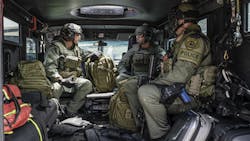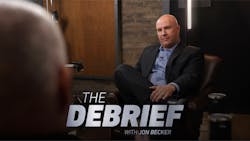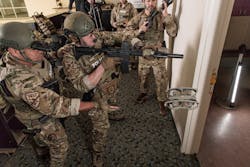When Jon Becker founded Aardvark Tactical back in 1987 at the age of 17, it started as a rock-climbing company, selling ropes and other equipment. It would have been difficult for the then-college freshman to imagine how his company would evolve. The self-described “tactical Forrest Gump” dealt with special operations units from the get-go and ended up meeting, and becoming good friends, with some of the pioneers of SWAT.
This article appeared in the July issue of OFFICER Magazine. Click Here to view the digital edition. Click Here to subscribe to OFFICER Magazine.
As Aardvark grew, Becker began receiving requests for tactical nylon gear and chemical agents. He began researching tactical gear and equipment and started taking classes in his free time. By the age of 25 he had amassed just over 3,000 hours of special tactical training at various SWAT schools. This summer, Becker launched The Debrief podcast, which focuses on the stories of tactical officers and team leaders.Sharing tactics
About 20 years ago, Aardvark began hosting debriefs after a SWAT team was involved in an incident. “Because we’re not an agency, there’s no MOU involved, there’s no access to the press,” he says. “I can handpick an audience of people and invite them to my building and create a completely confidential relationship in a completely confidential space where now they can have an open discussion without fear of the media or litigation or things leaking.”
That effort grew into Aardvark’s lecture series, which is held several times per year. Following the 2015 terrorist attack at the Inland Regional Center in San Bernardino, California, in which 14 people were killed and another 22 were wounded, the first debrief was done at Aardvark’s headquarters. “It was just weeks after, and nobody knew about it,” says Becker. “We just did one with the LAPD on their two hostage rescues. We created this confidential space where we can now enable these people to come and spread information and build a handpicked audience for them.” He says that this foundation was the genesis for The Debrief podcast.
The podcast was launched on June 8 first with two episodes and then a new episode every two weeks and will include both video and audio-only versions. “I know a lot of people consume podcasts by listening to them, but the video is really compelling,” he says. “I know that I’m interviewing people that have never been interviewed, which I think is really interesting.”
The tactical operators are willing to talk to him, because he’s earned their trust over time. “I talk to a lot of people who would never speak to the media because they can’t,” he says. “Ultimately, I get to make the decision on what footage goes out. I can also make a decision what footage doesn’t go out.”Preserving history
A few years ago, one of Becker’s SWAT friends was diagnosed with ALS and died. “Several of us were sitting around having this conversation about how much knowledge died with him. I had this realization that, as somebody who had kind of the front row seat for the history of special tactics … I started to realize that those stories have never been told.”
What followed was the idea to launch a podcast that would share some of those stories so they can be shared with others and saved. “I said, ‘We’ll record a couple of episodes and see what happens,’ and they were unbelievable. I couldn’t believe how compelling and interesting it was,” he says. “We’ve created this podcast specifically to provide a platform not only to tell those stories, but to capture that knowledge and to pass that knowledge through the community so that we don’t end up having to reinvent things, so that we can raise the knowledge level of the modern operator because the original guys who did it were the originators, so they knew at a very deep level what their subject matter was.”
Becker noted the law enforcement community is forced to be quiet and is forced to be confidential. “You look at what’s going on politically right now where law enforcement is under another round of attack and they don’t defend themselves because they can’t defend themselves,” he says. “I do think there is something here where maybe people will get a little bit of a different perspective on tactical cops and military operators. Maybe they’ll understand why these guys do it, because a lot of them are in it for the right reason.”
Learn more about The Debrief podcast at: https://thedebrief.live
This article appeared in the July issue of OFFICER Magazine.
About the Author
Paul Peluso
Editor
Paul Peluso is the Managing Editor of OFFICER Magazine and has been with the Officer Media Group since 2006. He began as an Associate Editor, writing and editing content for Officer.com. Previously, Paul worked as a reporter for several newspapers in the suburbs of Baltimore, MD.



